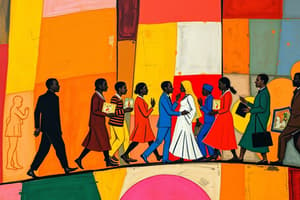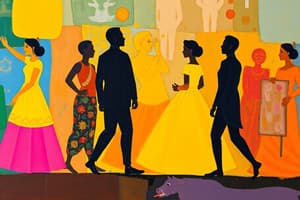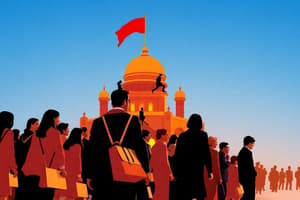Podcast
Questions and Answers
What is the main distinction used in closed social systems like South African apartheid and American Jim Crow laws?
What is the main distinction used in closed social systems like South African apartheid and American Jim Crow laws?
- Occupation
- Income
- Education
- Race (correct)
Which system allows for more social mobility based on both ascribed status and personal achievement?
Which system allows for more social mobility based on both ascribed status and personal achievement?
- Caste system
- Class system (correct)
- Feudal system
- Soviet system
In a mixed system like modern Britain, what elements does it combine?
In a mixed system like modern Britain, what elements does it combine?
- Caste and class (correct)
- Education and race
- Feudal estates and race
- Income and occupation
What justifies inequality by claiming that anyone can move up the social hierarchy through hard work?
What justifies inequality by claiming that anyone can move up the social hierarchy through hard work?
Which characteristic defines a closed social system like the Indian caste system?
Which characteristic defines a closed social system like the Indian caste system?
Flashcards are hidden until you start studying
Study Notes
- Two people under discussion: one inherited wealth, other earned it through hard work and clever dealing.
- Social stratification is a system of categorizing and ranking people in a hierarchy, affecting various aspects of life.
- Universal but variable, it shows up in every society and divides people differently, resulting in different life chances.
- Social stratification is a characteristic of society, not an individual difference.
- Children of wealthy families have better chances of living longer, attending college, and excelling in school than those born into poverty.
- Stratification persists across generations, perpetuating inequality.
- Societies allow some degree of social mobility, with upward and downward movements possible.
- Structural factors, such as economic forces and job changes, influence social mobility.
- Social stratification isn't just economic and social; it's also about beliefs that make systems function.
- Closed systems of stratification, such as caste systems, are rigid and allow little social mobility, based on ascribed status.
- Open systems of stratification, like class systems, allow for social mobility and are based on both ascribed status and personal achievement.
- American society has a meritocratic class system, with the idea that anyone can move up through hard work.
- Class systems have elements of meritocracy but still reproduce existing class inequalities due to advantages starting points.
- Status inconsistency occurs when a person experiences positive and negative influences on their social status.
- Socioeconomic status includes income, education, and occupational prestige.
- Indian caste system is an example of a closed, rigid, and unequal system with strong religious and cultural beliefs.
- Feudal Europe had a closed social system with three estates, where birth determined social standing.
- Race has been used as the main distinction in closed social systems, such as South African apartheid and American Jim Crow laws.
- Class systems are open and allow for more social mobility, based on both ascribed status and personal achievement.
- The American dream is the belief that anyone can move up the social hierarchy through hard work, but meritocracy is a justification for inequality.- Social status inconsistency: Low income decreases social status, while high education and college professor occupation increase it.
- Spectrum of systems: Closed and open systems are two extremes on a social stratification spectrum.
- Mixed system example: Modern Britain has elements of both caste and class systems.
- Stratification in the Soviet Union: Inequality existed despite theoretical classlessness, with apparatchiks, intelligentsia, industrial workers, and rural peasantry each holding political power and prestige.
- Studying societies: Analyzing a society's stratification and social mobility is crucial.
- Crash Course Sociology: Filmed in Missoula, MT, made with Thought Cafe animation team and Adobe Creative Cloud, supported by patrons on Patreon.
Studying That Suits You
Use AI to generate personalized quizzes and flashcards to suit your learning preferences.



